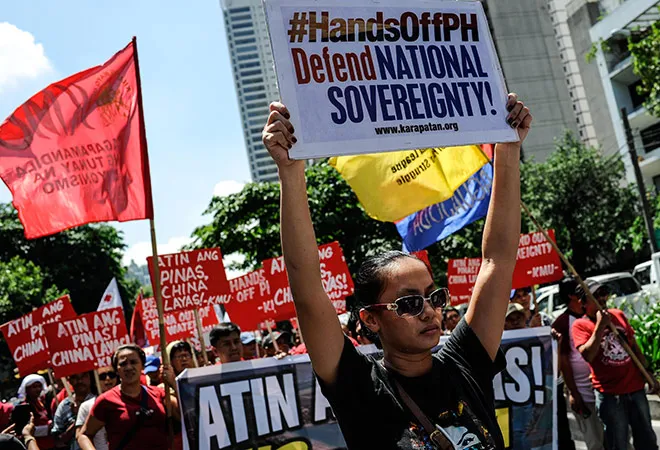
Tensions between China and the Philippines flared up earlier this month, after a Chinese fishing vessel (Yuemaobinyu 42212) making its way from the Guandong Province for a ‘purse seine operation,’ hit and sank a Filipino fishing vessel (F/B Gimver I) with 22 fishermen on board on 9 June 2019 . The fishermen were eventually rescued by a Vietnamese ship which was also in the area. The incident which is being referred to as a ‘hit-and-run’ occurred in Reed Bank or Recto Bank in the South China Sea, a shallow area about 150 km from the Philippine island of Palawan and within the latter’s exclusive economic zone. Official statements from the two countries offer slightly different versions with China claiming that it intended to rescue the fishermen in the wrecked vessel but was afraid of being besieged by other Filipino boats. Beijing has gone on to state that it was an ordinary maritime accident and that the issue was being irresponsibly blown out of proportion for political reasons. On the other hand, Manila responded that the specified intent of rescuing was nothing short of a smokescreen for the actual event of hitting the vessel in the first place.
The incident which is being referred to as a ‘hit-and-run’ occurred in Reed Bank or Recto Bank in the South China Sea, a shallow area about 150 km from the Philippine island of Palawan and within the latter’s exclusive economic zone.
While Chinese official sources state that the vessel in question was a fishing boat, it was in fact part of the Chinese Maritime Militia. The militia is a paramilitary force deployed for patrol, surveillance, and resupply and engaged in bolstering Chinese presence in the South and East China Seas and they report directly to the PLAN. Indeed it is believed that what are recognised as Chinese fishing vessels are actually the country’s maritime militia which makes it convenient for the country to disguise what should otherwise be considered aggression, as merely an accident. The presence and advances of the militia has already become an issue with other countries like Australia, the US and rocks and formations in the South China Sea like Sandy Cay.
The incident has thrown into sharp relief two features - the importance of positioning and the possibility of easy and hasty intensification.
China is undeniably the only country which is keeping the waters of the South China Sea restive. China’s actions have been and continue to remain problematic as it routinely flouts sovereign and international norms. This incident, which is by no means the first or the only one, is one among a long list of instances in which the country has violated these norms. In fact, it was these frequent violations which resulted in Manila moving the International Court of Justice against Chinese encroachment into its maritime territory. What is more striking than the frequency of the disturbances is perhaps the fact that despite the Court ruling in favor of the Philippines (in 2016), China refused to acknowledge it, clearly indicating its adamant position on maritime issues in its neighboring waters.
There is in a sense, for years, a status quo of tensions in the South China Sea. The South China Sea has been the focal point of frequent upheaval and therefore much discussion over the better part of the last decade. With what are generally recognised as competing sovereignty claims over maritime territory being the source of much of the unrest, there are also added tensions resulting from expansionist presence of Beijing which has sought to literally make its presence be felt.
China’s actions have been and continue to remain problematic as it routinely flouts sovereign and international norms. This incident, which is by no means the first or the only one, is one among a long list of instances in which the country has violated these norms.
This episode has sparked vociferous protests in the Philippines with demonstrators burning Chinese flags and calling for the “End China <’s> Aggression.” The demonstrations have invited strong reactions from civilians who have expressed frustrations at what they perceive as inaction by the government. While the initial reaction from Manila included the Defence Secretary Delfin Lorenzana condemning the act as well as the desertion of the sinking boat by the Chinese vessel and Vice President Leni Robredo calling for an investigation, the President’s reaction has been delayed and understated to the point of downplaying the occurrence as merely a collision. The demonstrations show that there is, among a section of the population, a growing discontent with the government’s handling of Beijing’s activities to the extent that there are claims of the leader giving preference to the Chinese migrant workers over local Filipinos.
Among the countries which have been the most visible in terms of their altercations with Beijing is the Philippines, which even moved court against the latter in 2015. However, in international politics, much depends on the regime that is in power in a country as that often determines the levels of friendliness and cooperation or otherwise. While history, legality and a host of other factors have a major role to play in the contour of bilateral and multilateral communications, the attitude and role of a country’s leader often defines the attendant atmosphere and also lays the foundations of future course of bilateral and multilateral interactions. Under President Duterte who took office in 2016, there has been a marked shift in policy oriented towards Beijing. While Manila was previously one of the most vocal countries calling out Beijing’s illegal advances in the region, since Duterte, the stance has been a hot and cold one – more often muted and at times loud – mostly, the President has sought to set aside its maritime differences with Beijing. Duterete defends his position by stating that a small country like the Philippines cannot take on a powerhouse like China – a position that is perceived as being subservient. What is interesting to note in this respect is that he has also disregarded offers for support and multilateral action. Independent or concerted action requires acknowledging the predicament – a review of position by Duterte would thus be essential to take necessary measures in an event like this.
The 9 June incident marks a dangerous turn because while it once again displays Beijing’s intent and insistence on finding itself in waters which are legally, another country’s territory, it also indicates a new level of impudence with the utilisation of the Chinese maritime militia.
The 9 June incident marks a dangerous turn because while it once again displays Beijing’s intent and insistence on finding itself in waters which are legally, another country’s territory, it also indicates a new level of impudence with the utilisation of the Chinese maritime militia. The structure of the militia makes it ideally suited for advancing Beijing’s interests in the disputed waters through low-intensity encounters which simultaneously disrespect law and sovereignty while keeping tensions alive.
In the near future, altercations that the maritime militia would be involved in may also determine the nature and extent of involvement of extra-regional powers like the US which has already pointed out that incitement by the militia will be considered equivalent to those conducted by the navy’s warships. While this signals a tough stance by the US, it also implies that such encounters may easily escalate to the level of a full blown conflict. Unless there is a significant dialing down of tensions undertaken by Beijing, we may be witness to a situation spiraling swiftly to a point of no return.
The views expressed above belong to the author(s). ORF research and analyses now available on Telegram! Click here to access our curated content — blogs, longforms and interviews.




 PREV
PREV


